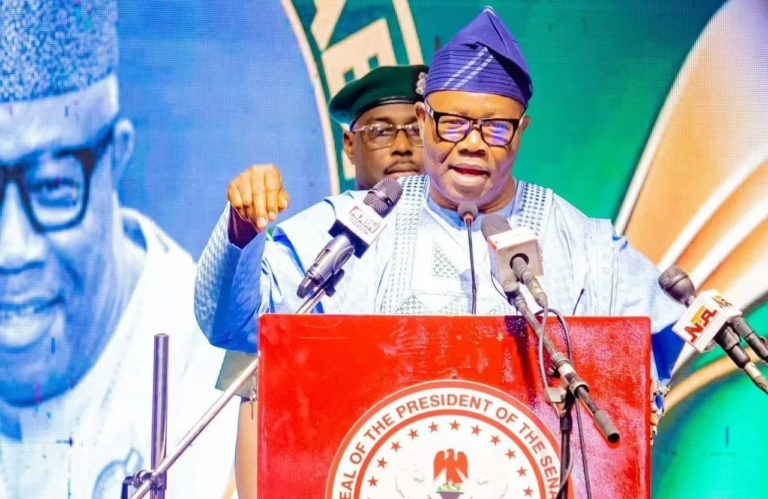On Monday, Senate President Godswill Akpabio, Deputy Speaker of the House of Representatives Rep. Benjamin Kalu, alongside leaders from all registered political parties under the Inter-Party Advisory Council (IPAC), united to forge a renewed vision for democratic revitalization, inclusivity, and institutional reform amid the ongoing constitutional review process.
The meeting, organized by the House Committee on Constitution Review in Abuja, convened national chairpersons, secretaries, and women’s representatives from political parties to examine proposed constitutional amendments. Key topics included reforms in the judiciary and electoral systems, autonomy for local governments, enhanced representation for women, the introduction of state policing, and the safeguarding of human rights.
Senator Tahir Mongonu, speaking on behalf of the Senate President, emphasized the necessity for political leaders to regard the Constitution as a dynamic framework that must adapt to Nigeria’s evolving socio-political landscape.
“Our gathering today is rooted in a shared conviction that the Constitution must be a living document, responsive to the nation’s progress,” Mongonu remarked. “This dialogue with political parties is not merely procedural; it is a landmark moment affirming that Nigeria’s democracy remains vibrant, receptive, and forward-moving.”
He highlighted that the issues under consideration-from judicial reforms to women’s empowerment and local government independence-are fundamental to the Republic’s vitality, underscoring that democracy must be resilient and effective.
Mongonu cautioned that the credibility of elections and the administration of justice are the cornerstones of a thriving democracy.
“Elections are not ceremonial acts; they embody the essence of democracy. When electoral processes falter, public trust erodes. When justice is delayed, confidence diminishes,” he asserted.
He advocated for a more robust Independent National Electoral Commission (INEC) and a judiciary free from corruption and political interference, citing successful institutional reforms in countries like Brazil and Canada as models for Nigeria to emulate.
Senate President Akpabio stressed that authentic federalism must originate at the grassroots level, urging the transfer of authority and resources to local governments to make democratic governance more accessible and meaningful to citizens.
Addressing gender representation, Akpabio called for Nigeria to transition from mere verbal commitments to concrete policies that promote women’s participation, referencing how female leadership has catalyzed progress in nations such as Rwanda and New Zealand.
“A democracy that marginalizes women undermines its own strength. Where women lead, societies flourish. Nigeria must shift from sympathy to actionable inclusion,” he declared.
On the subject of state policing, Akpabio described it as a practical solution tailored to Nigeria’s security challenges.
“Advocating for state policing is not an act of defiance but a realistic approach,” he explained. “However, in pursuing security, we must safeguard freedoms. The protector’s hand must never become a silencer.”
He reaffirmed the National Assembly’s dedication to working collaboratively with all stakeholders, emphasizing that the constitutional review is an ongoing journey rather than a static achievement.
“By upholding justice, inclusivity, and accountability, we will be remembered as leaders who transformed rhetoric into reality,” Akpabio concluded.
Deputy Speaker Benjamin Kalu, who chairs the House Committee on Constitution Review, described the engagement as the most comprehensive and participatory constitutional amendment process in Nigeria’s democratic history.
Reflecting on over two decades since the 1999 Constitution, Kalu urged a critical evaluation of whether the current governance framework aligns with the aspirations of today’s Nigerians.
“This is a pivotal moment for reflection,” he stated. “We must determine if our Constitution serves the Nigeria of the present or remains anchored to a past era.”
Kalu acknowledged that while democracy has matured through successive elections and peaceful transitions, many Nigerians-particularly women and local communities-still feel marginalized.
“Political parties are not mere participants; they are the pillars of our democracy,” he said. “For these amendments to endure, they must embody a consensus that transcends partisan divides.”
He outlined the Committee’s focus areas, including guaranteed legislative representation for women, financial independence for local governments, and streamlined electoral dispute resolution to ensure elections genuinely reflect the electorate’s will.
“Good intentions alone cannot sustain democracy,” Kalu warned. “We require robust institutions, clear regulations, and a Constitution that empowers democratic governance.”
Yusuf Mamman Dantalle, National Chairman of IPAC, praised the National Assembly for spearheading what he termed a “patriotic and visionary constitutional review” aimed at restoring confidence in Nigeria’s electoral system.
Dantalle reiterated IPAC’s commitment to advocating for constitutional and electoral reforms that strengthen and deepen Nigeria’s democracy, especially in light of recurring challenges in previous elections.
“As the platform responsible for producing elected officials, IPAC is dedicated to ensuring elections are fair, transparent, and inclusive, providing equal opportunities for all political parties,” he affirmed.
Presenting IPAC’s formal proposals, Dantalle recommended several key reforms, including:
- Abolishing State Independent Electoral Commissions (SIECs) and empowering INEC to oversee all 774 local government elections to guarantee credible grassroots electoral processes.
- Creating an Independent Appointment Committee (IAC) composed of representatives from political parties, civil society, the National Judicial Council, and the National Assembly to appoint INEC officials, thereby enhancing the Commission’s autonomy.
- Reinstating public funding for political parties with transparent financial accountability mechanisms.
- Establishing an Electoral Offences Commission tasked with prosecuting electoral crimes such as vote-buying, ballot snatching, and result manipulation.
- Allowing political parties to fill vacant legislative seats caused by defections or deaths, avoiding costly by-elections.
Dantalle also voiced strong support for special legislative seats reserved for women, emphasizing that gender inclusion is vital for democratic fairness and societal stability.
“When segments of society are excluded from policymaking, they feel disenfranchised. Empowering women fortifies democracy,” he noted.
He concluded with optimism that this constitutional review would culminate in a “people’s Constitution” grounded in equality, justice, and the protection of fundamental rights.


















